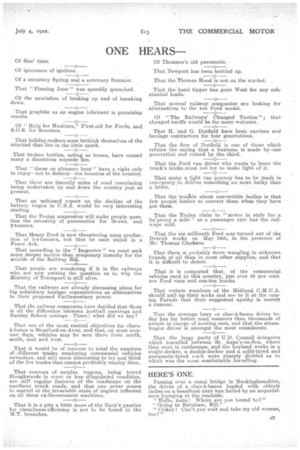ONE HEARS
Page 3

If you've noticed an error in this article please click here to report it so we can fix it.
Of flies' time.
Of ignorance of ignition.
Of a summery Spring and a summary Summer.
That "Flaming June" was speedily quenched.
Of the unwisdona of braking up and of breaking down.
That graphite as an engine lubricant is promising results.
Of " Help for Hauliers," First-aid for Fords, and S.O.S. for Scooters.
That holiday-makers must bethink themselves of the mischief that lies in the little spark.
That broken bottles, acting as lenses, have caused many a disastrous wayside fire.
That " those on pleasure bent" have a right only to enjoy—not to destroy-•the beauties of the country.
That there are literally miles of road resurfacing being undertaken up and down the country just at present.
That an unbiased report on the decline of the battery wagon in U.S.A. would be very interesting reading. 0 That the Trojan suspension will make people question the necessity of pneumatics for 30-cwt. and 2-tanners.
That Henry Ford is now threatening mass production of 3-4-tonners, but that he once sailed in a Peace Ark. 0 That according to the " Inspector " we must seek some deeper motive than temporary insanity for the suicide of the Railway Bill, That people are wondering if it is the railways who are now putting the question as to why the Ministry of Transport is still alive.
That the railways are already discussing plans for big subsidiary haulage organizations as alternatives to their proposed Parliamentary power.
That the railway companies have decided that there is all the difference between football meetings and Sunday School outings. There what did we say ?
That one of the most central objectives for charsh-bancs is Stratford-on-Avon, and that, on most summer days, vehicles may be seen there from north, south, east and west.
That it would be of interest to total the numbers of , different trades employing commercial vehicles nowadays, and still more interesting to try and think • of the few trades that cannot profitably employ them.
That convoys of surplus wagons, being towed Sloughwards in more or less dilapidated condition, are still regular features of the roadscape on the .northern trunk roads, and that one never ceases to marvel at the invariable state of neglect reflected on all these ex-Government machines.
That it is a pity a little more of the Navy's passion for cleanliness-efficiency is not to be found in the M.T. branches. Of Thomson's old pneumatic.
That Newport has been bottled up.
That the Thomas Hood is not on the market.
That the hand tipper has gone West for any substantial loads.
That several railway companies are looking for alternatives to the ton Ford model.
Of "The Railways' Changed Tactics " ; that changed tariffs would be far more welcome.
That H. and G. Dutfield have been carriers and haulage contractors for four generations.
That the firm of Dutfield is one of those which refutes the saying that a business is made bpone generation and ruined by the third, That the Ford van driver who wants to learn the truck's tricks must not try to make light of it.
That many a light van journey has to be made in emergency to deliver something no more bulky than a letter.
That the troulole about convertible bodies is that few people bother to convert them when they have got them.
—0 That the Trojan claim to "motor in style for a ha'penny a mile" as a passenger rate has the railways cold.
That the six millionth Ford was turned out of the Detroit works on May 18th, in the presence of Mr. Thomas Clarkson.
That there is probably more wangling: in unknown brands of oil than in most other supplies, and that it is difficult to detect.
That it is computed that, of the commercial vehicles used in this country, just over 50 per cent. are Ford vans and one-ton trucks.
That certain members of the Midland C.M.TJ,A. should pull up their socks and see to it at the coming Parade that their suggested apathy is merely a rumour.
That the average lorry or char-h-banes driver today has far better road manners than thousands of people in charge of touring ears, and that the steam,wagon driver is amongst the most considerate.
That the large party of U.D. Council delegates which travelled between -St. Anne's-on-Sea, where they were in conference, and the Leyland works in a single-decker, a double-decker and a solid-tyred and pneumatic-tyred c-a-b were sharply divided as to which was the most comfortable travelling.








































